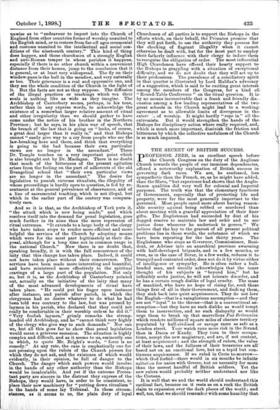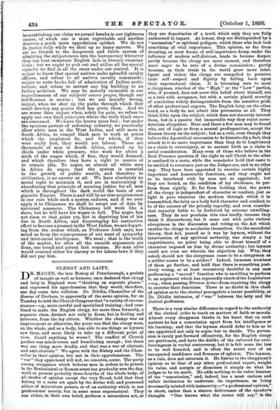THE SECRET OF BRITISH SUCCESS.
PROFESSOR JEBB, in an excellent speech before-- the Church Congress on the duty of the Anglican• Church towards the people of our immense dependencies, offered a noteworthy explanation of British success in- governing dark races. We are, he confessed, less • sympathetic than the French, or, as he might have added, than the Slays, "but experience had shown that the Anglo- Saxon qualities did very well for colonial and Imperial. purposes. The truth was that the elementary functions of Government, especially that of protecting life and property, were far the most generally important to the governed. Most people cared more about having reason-• able security against being robbed or murdered than about meeting with a graceful appreciation of their finer• gifts. The Englishman had succeeded by dint of . his dogged resolve to maintain law and order and to sees justice done wherever he undertook to govern." We believe that the key to the gravest of all present politica/. problems lies in those words, the substance of which we have been repeating for the last thirty years. The • Englishman who steps as Governor, Commissioner, Resi- dent, or Adviser into an anarchical province swarming with half-developed brigands, and in a few month s, or even, as in the case of Berar, in a few weeks, reduces it to tranquil and contented order, does not do it by virtue either of intelligence or sympathy. He is often rather a bull.. headed man, and usually acknowledges that the inner thought of hit; subjects is "beyond him," but he inflexibly seeks justice, he will not tolerate disorder, and he has a certain rough dislike of legal cruelty. The mass of• mankind, who have no hope of rising far, seek these- things first of all in their Government, and finding them,. they sink back into quiet acquiescence. They do not love the English—that is a vainglorious assumption—and they • are not " loyal " to the throne—that is a conventional as- sumption—but they have no such dislike as would tempt . them to insurrection, and no such disloyalty as would urge them to break up that marvellous Paz Britannica • which renders millions of square miles of obscure territory populated by half-civilised or savage races as safe as a London street. Your watch runs more risk in the Strand_ than in Dacca or Kandy. They turn to their occupa- tions, accept the new magistracy, and are, if not content, at least acquiescent ; and the strength of rulers, the value of their laws, and the fullness of their treasuries are all- based not on an emotional love, but on a tepid but con- tinuous acquiescence. If we ruled in Crete to-morrow-- which God forbid—there would in six months be infinite agitation for union with Greece, but no necessity for more than the merest handful of British soldiers. Yet the new rulers would probably neither understand nor like the Cretans.
It is well that we and the world should understand this cardinal fact., because on it rests as on a rock the British claim to expansion over the dark places of the world ; and well, too, that we should remember with some humility that
in establishing our claim we permit breaks in our righteous course, of which one is most regrettable and another deserves a much more opprobrious epithet. We do not do justice fully while we shut up so many careers. We are no friends to the dangerous and futile system of
admitting the subject-races into the bureaucracy whenever they can beat immature English lads in literary examina- tions ; but we ought to pick out and utilise all the special capacity we find in all the races under our control. It is unjust to know that special natives make splendid cavalry officers, and refuse to all natives cavalry commands ; unjust to write books full of admiration of Indian archi- tecture, and refuse to entrust any big building to an Indian architect. We may be morally excusable in our regardlessness of our subjects' amour propre, though our indifference is unwise ; but we are morally wrong, unjust, when we shut up the paths through which they could develop any genius God has given them. And we are worse than unjust when, solely for gain, we refuse to apply our own fixed principles where the truly black races are concerned. We leave the brown races free ; but under the specious pretext of enforcing industry, we practically allow white men in the West Indies, and still more in South Africa, to compel black men to work at prices which the employers fix, and for which, if they were really free, they would not labour. There are thousands of men in South Africa, ordered up by chiefs under white pressure, who work for about a sixth of the wages which, if free, they would demand, and which therefore they have a right to receive or to remain idle. To argue, as almost all white men in Africa do argue, that the system is essential to the growth of public wealth, and therefore to civilisation, is no answer at all. We have absolutely no moral right to maintain it, and are in maintaining it abandoning that principle of securing justice for all men which is throughout the dark world the basis of our gigantic Empire. There is and will be no true acquiescence in our rule while such a system endures, and if we ever apply it to Chinamen we shall be swept out of Asia by universal massacre. The Chinaman will work like a slave, but he will have his wages in full. The negro has not risen to that point yet, but in depriving him of his due in South Africa, and discouraging his instinctive effort to become a peasant in the West Indies, we are depart- ing from the course which, as Professor Jebb says, has saved us from the consequences of our want of sympathy and inter-racial intelligence. We steal ; that is the truth of the matter, for after all the smooth arguments are done, one broad and patent fact remains. No man alive would contend either for slavery or for labour laws if they did not pay him.







































 Previous page
Previous page